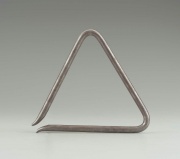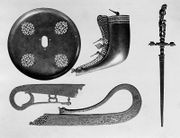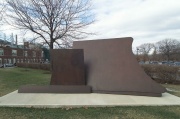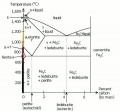Difference between revisions of "Steel"
m (Text replace - "\[http:\/\/cameo\.mfa\.org\/materials\/fullrecord\.asp\?name=([^\s]+)\s(.*)\]" to "$2") |
|||
| Line 1: | Line 1: | ||
| − | [[File:17.2048a-SC34144.jpg|thumb| | + | [[File:17.2048a-SC34144.jpg|thumb|Steel triangle<br>MFA # 17.2048a]] |
== Description == | == Description == | ||
| − | + | [[File:MFA16352 Steel.jpg|thumb|16th c. steel daggar<br>MFA# 16.253]] | |
A high-strength [[iron|iron]] alloy containing not more than 2% [[carbon|carbon]]. Steel may also contain small amounts of [[phosphorus|phosphorus]], [[sulfur|sulfur]], [[manganese|manganese]], [[silicon|silicon]], [[aluminum|aluminum]], [[titanium|titanium]], [[copper|copper]], [[molybdenum|molybdenum]], and [[nickel|nickel]]. Small amounts of steel were made into swords and cutting implements in antiquity in Japan and India. From 1855-1875, Bessemer, Kelly, Thomas, Gilchrist, Mushet and others developed manufacturing procedures to quickly and consistently produce good quality steel from pig iron. Steel, with its strength, resilience, hardness and formability was being produced in quantities of 25 million tons a year by the end of the 19th century. It was primarily used for construction of ships, bridges, building and skyscrapers. Steel was also used for smaller items, such as knives, weapons, decoration and architectural components (grilles, doors, windows, roofing, gutters, brackets, wire cloth, cables and hardware). | A high-strength [[iron|iron]] alloy containing not more than 2% [[carbon|carbon]]. Steel may also contain small amounts of [[phosphorus|phosphorus]], [[sulfur|sulfur]], [[manganese|manganese]], [[silicon|silicon]], [[aluminum|aluminum]], [[titanium|titanium]], [[copper|copper]], [[molybdenum|molybdenum]], and [[nickel|nickel]]. Small amounts of steel were made into swords and cutting implements in antiquity in Japan and India. From 1855-1875, Bessemer, Kelly, Thomas, Gilchrist, Mushet and others developed manufacturing procedures to quickly and consistently produce good quality steel from pig iron. Steel, with its strength, resilience, hardness and formability was being produced in quantities of 25 million tons a year by the end of the 19th century. It was primarily used for construction of ships, bridges, building and skyscrapers. Steel was also used for smaller items, such as knives, weapons, decoration and architectural components (grilles, doors, windows, roofing, gutters, brackets, wire cloth, cables and hardware). | ||
See also [[carbon%20steel|carbon steel]], [[Cor-Ten|Cor-Ten]], and [[stainless%20steel|stainless steel]]. | See also [[carbon%20steel|carbon steel]], [[Cor-Ten|Cor-Ten]], and [[stainless%20steel|stainless steel]]. | ||
| − | [[File:1981.285-SC26501.jpg|thumb| | + | [[File:1981.285-SC26501.jpg|thumb|York Flats<br>MFA # 1981.285]] |
== Synonyms and Related Terms == | == Synonyms and Related Terms == | ||
acier (Fr.); Stahl (Deut.); acero (Esp.); staal (Ned.); aço (Port.) | acier (Fr.); Stahl (Deut.); acero (Esp.); staal (Ned.); aço (Port.) | ||
| − | == | + | == Risks == |
Inhalation of dust or metal fumes is dangerous. | Inhalation of dust or metal fumes is dangerous. | ||
| Line 22: | Line 22: | ||
</gallery> | </gallery> | ||
| − | + | == Resources and Citations == | |
| − | == | ||
* G.S.Brady, ''Materials Handbook'', McGraw-Hill Book Co., New York, 1971 Comment: p. 771 | * G.S.Brady, ''Materials Handbook'', McGraw-Hill Book Co., New York, 1971 Comment: p. 771 | ||
Revision as of 16:17, 2 November 2020
Description
A high-strength Iron alloy containing not more than 2% Carbon. Steel may also contain small amounts of Phosphorus, Sulfur, Manganese, Silicon, Aluminum, Titanium, Copper, Molybdenum, and Nickel. Small amounts of steel were made into swords and cutting implements in antiquity in Japan and India. From 1855-1875, Bessemer, Kelly, Thomas, Gilchrist, Mushet and others developed manufacturing procedures to quickly and consistently produce good quality steel from pig iron. Steel, with its strength, resilience, hardness and formability was being produced in quantities of 25 million tons a year by the end of the 19th century. It was primarily used for construction of ships, bridges, building and skyscrapers. Steel was also used for smaller items, such as knives, weapons, decoration and architectural components (grilles, doors, windows, roofing, gutters, brackets, wire cloth, cables and hardware).
See also Carbon steel, Cor-Ten, and Stainless steel.
Synonyms and Related Terms
acier (Fr.); Stahl (Deut.); acero (Esp.); staal (Ned.); aço (Port.)
Risks
Inhalation of dust or metal fumes is dangerous.
Additional Images
Resources and Citations
- G.S.Brady, Materials Handbook, McGraw-Hill Book Co., New York, 1971 Comment: p. 771
- Ralph Mayer, A Dictionary of Art Terms and Techniques, Harper and Row Publishers, New York, 1969 (also 1945 printing)
- Thomas C. Jester (ed.), Twentieth-Century Building Materials, McGraw-Hill Companies, Washington DC, 1995
- Tom Rowland, Noel Riley, A-Z Guide to Cleaning, Conserving and Repairing Antiques, Constable and Co., Ltd., London, 1981
- Michael McCann, Artist Beware, Watson-Guptill Publications, New York City, 1979
- Dictionary of Building Preservation, Ward Bucher, ed., John Wiley & Sons, Inc., New York City, 1996
- Ivan Amato, Stuff: The Materials the World is Made of, Avon Books, New York, 1997 Comment: p. 46
- Website address 1 Comment: Steel at www.answers.com




